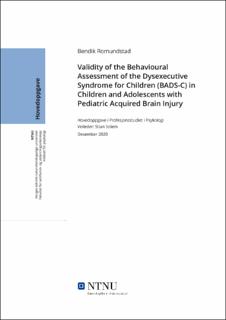| dc.contributor.advisor | Solem, Stian | |
| dc.contributor.advisor | Finnanger, Torun Gangaune | |
| dc.contributor.author | Romundstad, Bendik | |
| dc.date.accessioned | 2021-09-13T16:19:39Z | |
| dc.date.available | 2021-09-13T16:19:39Z | |
| dc.date.issued | 2020 | |
| dc.identifier | no.ntnu:inspera:65731347:10254083 | |
| dc.identifier.uri | https://hdl.handle.net/11250/2776086 | |
| dc.description.abstract | Svekkede eksekutive funksjoner (EF) i hverdagen er utbredt blant barn og ungdommer med ervervet hjerneskade (pABI). Likevel er det omstridt hvorvidt hverdagslig EF kan måles tilstrekkelig med nevropsykologiske tester. The Behavioural Assessment of the Dysexecutive Syndrome for Children (BADS-C) ble utviklet for å adressere behovet for en standardisert, økologisk valid nevropsykologisk test av EF for barn og ungdommer. Testens psykometriske egenskaper er imidlertid mindre forsket på. Målet med denne artikkelen var derfor å undersøke den diskriminerende, samtidige, og økologiske validiteten til BADS-C i et utvalg 74 barn og ungdommer mellom 10 og 17 år med pABI, i tillegg til 60 friske kontroller. Resultatene viste at gruppen med pABI presterte signifikant dårligere enn kontrollgruppen på alle BADS-C variabler, utenom Playing Cards Test. BADS-C total score, Key Search Test og Zoo Map Test 1, var signifikant korrelert med etablerte nevropsykologiske tester og lærerutfylte spørreskjema av EF, men ikke med spørreskjema utfylt av foreldre eller ved selvrapport. Key Search Test og Zoo Map Test 1 predikerte også lærerutfylte spørreskjema av EF, utover IQ og etablerte tester av EF. Funnene indikerer at BADS-C er et godt verktøy med hensyn til diskriminerende validitet, og at deler av det, nærmere bestemt BADS-C total score, Key Search Test, og Zoo Map Test 1 er robust med hensyn til samtidig og økologisk validitet. Den økologiske validiteten til disse målene ser imidlertid ut til å være begrenset til skolekonteksten, basert på lærers oppfatning av barnet- eller ungdommens EF. | |
| dc.description.abstract | Impaired executive functions (EF) in everyday life is common among children and adolescents with pediatric acquired brain injury (pABI). Yet, it is controversial whether everyday EF can be adequately measured using neuropsychological tests. The Behavioural Assessment of the Dysexecutive Syndrome for Children (BADS-C) was developed in order to address the need for a standardized ecologically valid test of EF among children and adolescents. However, research on its psychometric properties is rather sparse. The aim of this study was therefore to investigate the discriminant, concurrent, and ecological validity of the BADS-C in 74 Norwegian children and adolescents aged 10-17 years with pABI, in addition to 60 healthy controls. Results showed that the pABI group performed significantly worse than the control group on all of the BADS-C measures, except for the Playing Cards Test. BADS-C total score, Key Search Test, and Zoo Map Test 1, were significantly correlated with established neuropsychological tests and teacher questionnaire ratings of EF, but not with parent or self-report. Also, Key Search Test and Zoo Map Test 1 significantly predicted teacher ratings of EF, beyond IQ and established EF tests. Findings indicate that BADS-C is a solid tool in terms of discriminant validity, and that parts of it, namely BADS-C total score, Key Search Test, and Zoo Map Test 1 are robust in terms of concurrent and ecological validity. However, the ecological validity of these measures seems to be limited to the school context, based on teacher perceptions of the children’s and adolescents’ EF. | |
| dc.language | | |
| dc.publisher | NTNU | |
| dc.title | Validity of the Behavioural Assessment of the Dysexecutive Syndrome for Children (BADS-C) in Children and Adolescents with Pediatric Acquired Brain Injury | |
| dc.type | Master thesis | |
